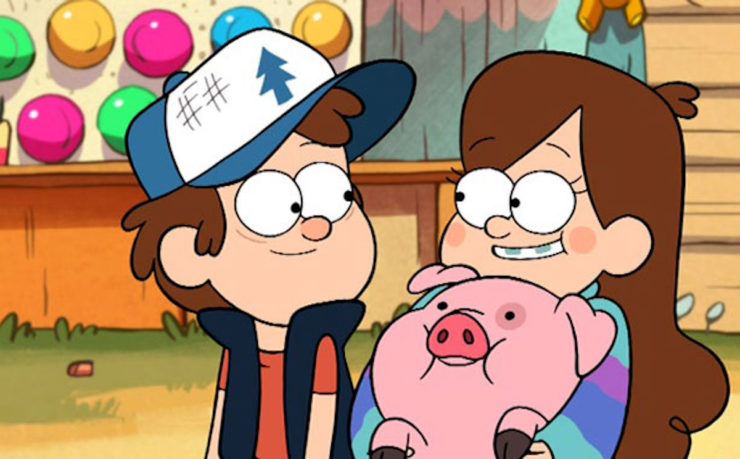Alex Hirsch’s Gravity Falls first premiered ten years ago and burned brilliantly for the two seasons it was on air before going out with a bang in 2016. The animated comedy-mystery follows twins Dipper and Mabel Pines (voiced by Jason Ritter and Kristen Schaal), who spend their summer vacation in the town of Gravity Falls working for their Grunkle Stan (voiced by Hirsch) at his tourist trap, The Mystery Shack. With the help of a journal which Dipper finds in the woods, the Pines twins begin to unravel the supernatural mysteries of the small town.
If you let this show pass you by at the time, then you should definitely remedy that and check it out now (it’s all on Disney+). Although it’s not an adult animation in the same way that shows like Rick and Morty and BoJack Horseman are, it definitely appeals to an older audience as well as kids (especially if you’re a comedy fan, given the delightful slate of guest stars who appear throughout the series, including Patton Oswalt, Chelsea Peretti, John Oliver, and “Weird Al” Yankovic, just to name a few.)
Gravity Falls is smart, hilarious, and heartfelt. From the initial premise it might seem like a simple Monster of the Week setup, but there’s a sophisticated overarching mystery lurking behind all of the creatively bizarre phenomena. Along with the fun monsters and adventure-driven storylines, there’s a stellar blend of clever and goofy humour, with in-jokes for viewers of all ages, lovably eccentric characters who are expertly voiced, and a setting and animation style that perfectly manages to balance bright whimsy with notes of truly dark creepiness.
Along with the Pines family, the show regularly features the Mystery Shack’s employees: There’s Soos (again voiced by Hirsh), a good-hearted and childish handyman, and Wendy (voiced by Linda Cardellini), a laid-back and rebellious part-time cashier. This eclectic group encounters oddities and mysterious creatures that tend to be much weirder (and often goofier) than your average ghosts and zombies or the occasional Bigfoot. For instance, in “Double Dipper,” there’s the chaotic hilarity of Dipper using a supernatural copy machine to make clones of himself in an attempt to impress Wendy. And in “Summerween” (the people of Gravity Falls love Halloween so much that they celebrate it twice a year) the gang is terrorized by the Summerween Trickster, an unsettling creature which devours children who disrespect the holiday.
If you find yourself drawn into this paranormal world, then you can even dive into the mystery-solving game by seeking out the cryptograms and ciphers that are hidden throughout the episodes. On a rewatch, you’ll also pick up on the countless background jokes, callbacks and connections between episodes, and foreshadowed details. And the intro song is unskippable, not only because it’s toe-tappingly catchy, but also because of the secret clues it holds…
While Gravity Falls draws you in with comedy and intriguing supernatural curiosities, at its heart lies something very deep and very real: the bond between Dipper and Mabel. Beyond the usual mix of sibling rivalry and affection, the Pines twins have a genuine friendship, and this core relationship serves as the emotional anchor for the weirder elements of the show. It should come as no surprise that Hirsh nailed the dynamic between Dipper and Mabel so effectively, given that they are based on his own relationship with his twin sister, Ariel. In an interview with Comics Alliance, Hirsh says he created Gravity Falls by taking his memories “of growing up with my sister and fusing them with some kind of magic weirdness.”
Dipper and Mabel work as a team, and although they like to tease each other, it always comes from a place of affection. That isn’t to say they don’t have their differences, but they aren’t in constant conflict in the way that many siblings depicted in TV shows and movies are. Storytelling is often driven by conflict, so it’s understandable that difficult sibling relationships are so common and get most of the attention in fictional portrayals. But it’s refreshing that the occasional clashes between the Pines twins feel like small, temporary hurdles to be overcome, rather than the status quo.
Buy the Book
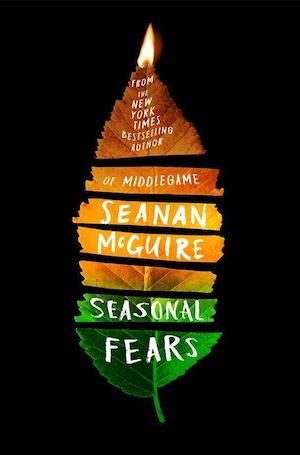

Seasonal Fears
In a documentary about the show, Hirsh states that “making the twins actually like each other was the fundamental bedrock of the series.” Hirsh and his sister discuss how Dipper and Mabel’s bond mirrors their own, with Ariel saying that no matter what arguments they get into, “they will always have each other’s back.” For the Hirsh siblings, being a twin means that “there’s a degree of comfort, meaning you can be your real self, and then you can get annoyed, and then you can forgive immediately.”
Siblings separated by age differences often don’t get on as well as twins (or at least, as well as the Hirsh and Pines twins). That was certainly my experience of growing up with a brother four years my senior. While we liked each other well enough growing up, we would never have considered the other to be a friend in any meaningful way. That changed when we worked the same job together as teenagers; as it turned out, this shared experience hit us at the right age and allowed us to develop a genuine friendship, one which we see reflected in the Pines twins. We first watched Gravity Falls together and both commented on how much we loved that it revolved around a positive sibling relationship.
When the Mystery Twins do clash, it usually arises out of their personality differences and/or the inevitable struggles of growing up. Dipper is logical, bookish, and super interested in investigating paranormal anomalies, à la Mulder in The X-Files. Mabel is fun-loving and extremely goofy, bravely throwing herself headfirst into situations. Their growing pains and idiosyncrasies sometimes set them apart, but they always manage to overcome their differences by working together instead of against each other.
While this wholesome relationship is very much at the center of Gravity Falls, the show also doesn’t shy away from the more difficult sibling dynamics which many people experience.
Warning: spoilers ahead.
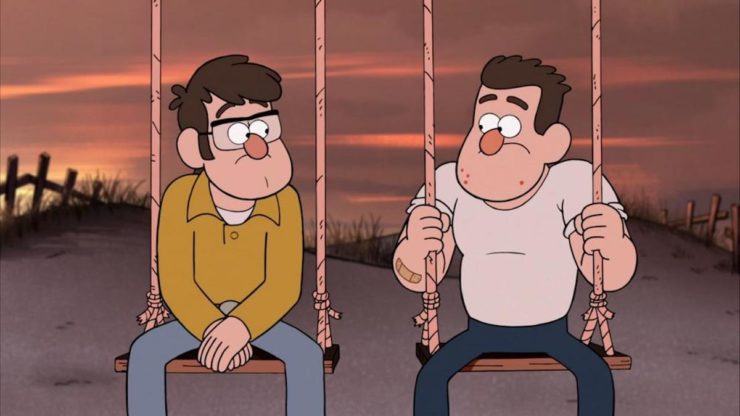
In contrast to Dipper and Mabel, Grunkle Stan and his long-lost twin brother Ford (voiced by J.K. Simmons) have a rocky relationship. In the season 2 episode “A Tale of Two Stans” the audience finally meets Ford and learns about the Original Mystery Twins’ tragic background. As children they were as inseparable as Dipper and Mabel, with Ford being the brains of the duo and Stan being the troublemaker. Ford’s ambition to attend a prestigious university across the country, rather than go sailing around the globe with Stan, caused the first cracks in their relationship. Things then went from bad to worse, resulting in a ten-year-period where they didn’t speak to each other. During this time Ford moved to Gravity Falls to study its weird anomalies. Once the Pines brothers were reunited, their old grudges resurfaced. During a fight Ford was accidentally pushed through an interdimensional portal, trapping him in the supernatural netherworld. After thirty years, Stan finally manages to free him, but their fraternal hostility and distrust remains.
Gravity Falls skillfully captures the complex push and pull of trying to heal a broken familial relationship. It’s easy to see where both brothers are coming from. Stan wants to be close to his brother but expresses it in destructive ways; Ford gets caught up in his dreams at the expense of his brother. There is clearly love between the two, but their old wounds are constantly splitting open.
For the rest of the series there is a lingering fear that Dipper and Mabel will be faced with a similar crisis in their relationship and, like Ford and Stan, will fail to overcome it. There are clear parallels between the pairs of twins; with Mabel and Stan being impulsive and Dipper and Ford being more academic. The fear that the younger twins will follow in the footsteps of the elder twins comes to a head in the final episodes. Kicking off in “Dipper and Mabel vs. the Future,” the climatic storyline concerning inter-dimensional demon Bill Cipher’s apocalyptic chaos is expertly woven together with the question of the ultimate fate of Dipper and Mabel’s friendship.
While Ford and Dipper are on a mission to patch the interdimensional rift which is keeping Bill at bay, Mabel is becoming increasingly stressed about turning thirteen and attending high school (understandably so). Ford asks Dipper to stay in Gravity Falls to become his apprentice, and Mabel, overhearing this conversation, is distraught at the thought of being parted from her brother. This conflict clearly echoes the original split which tore Ford and Stan apart.
Bill, possessing the body of Blendin Blandin (voiced by Rick and Morty’s Justin Roiland), tells Mabel that if she gives him the rift, he can create a time bubble for her so she can live in an everlasting summer. She agrees, unaware of the consequences, thereby allowing Bill to destroy the rift and start Weirdmageddon.
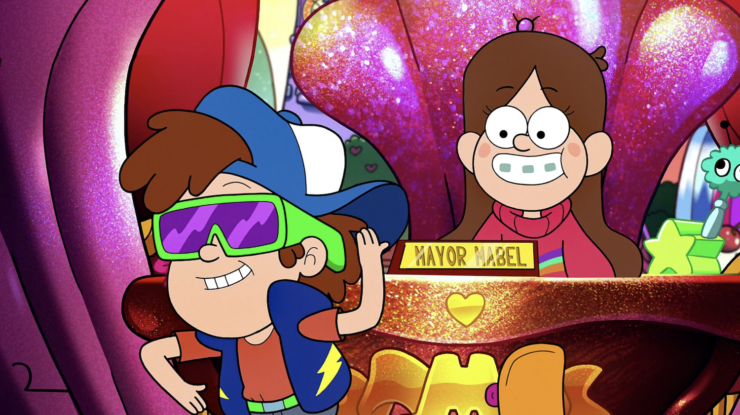
The crux of the problem is that Mabel doesn’t want to grow up and Dipper wants to grow up too fast.
Ford’s offer to Dipper initially seems like a dream come true; he is finally being told that his obsession with paranormal weirdness is not only valid but valuable. Plus, he will get to skip high school and immediately embark on what he considers to be his future. But he’s concerned that he can’t do it without his sister, a sentiment which Ford doesn’t share. Ford’s arrogance about his own intelligence causes him to see emotional attachments as a weakness. He believes Dipper and himself to be special in comparison to everyone else, including their siblings…and initially, at least, Dipper drinks the Ford Pines Kool-Aid.
Admittedly, Mabel’s reaction in these episodes seems selfish. She thinks purely about herself rather than reflecting on what Dipper could gain by staying with Ford. But Dipper doesn’t change his mind and choose to stay with Mabel just to appease her and free her from Mabeland (the imaginary world in which she’s been imprisoned by Bill). He chooses his sister because he realizes that’s what he needs too. Neither twin wants to be a teenager, with Mabel clinging to childhood and Dipper wanting to skip directly into adulthood. Each twin needs the other to tackle the challenges of adolescence because they balance each other out and help to make each other better people.
Ford is the adult Dipper aspires to be, but he is also a cautionary tale. Ford views his brother as a roadblock on his journey to higher knowledge. He prioritizes his own genius at the expense of everything else. Dipper doesn’t see himself as being held back by his sister in the same way. He can see the cracks in his hero’s way of life and understands that his connection to Mabel is both an asset and a necessity. He eventually recognizes that he can’t just skip over being a teenager and that he needs Mabel’s support, humour, and bravery to get through it. Unlike Ford, Dipper will chase his dreams with his sibling by his side and be all the stronger for it.
Dipper and Mabel’s ability to work together is the key to their continued growth and courage in facing the future, but it is also the key to defeating Bill. They play off of each other’s strengths, which in turn sets an example for Stan and Ford to follow. When everything appears to be lost, the brothers lament their inability to get along like they did when they were younger and wonder how Dipper and Mabel do it even when the world is about to end. Stan believes it’s because “they’re kids, they don’t know any better.”
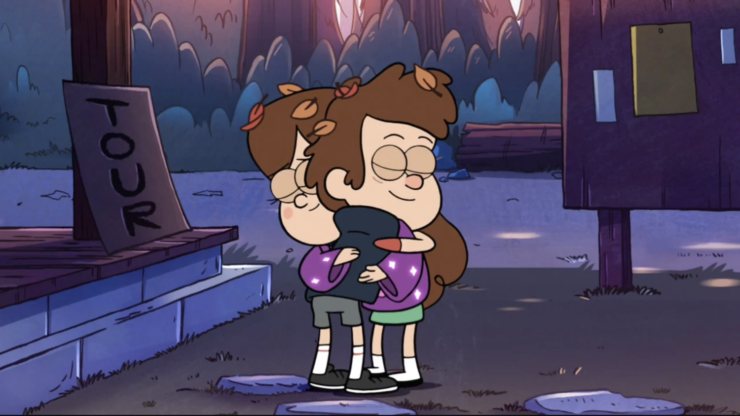
But in reality, despite their young age, it’s because of the maturity of their relationship that they’re able to rely on each other. Dipper and Mabel always give each other the benefit of the doubt and are quick to offer sincere apologies when they’ve hurt one another. In comparison, Stan and Ford tend to bring out the worst in each other and never admit their own faults. Happily, a shared moment of genuine remorse between the brothers finally allows them to move past their animosity, and they hatch a plan in which they finally work together. It is only by joining forces that they manage to defeat Bill and save not only Gravity Falls, but also their relationship.
Gravity Falls is not just about how hard and confusing growing up can be; it’s also about how hard and confusing (but also strange and hilarious and magical) life is in general. But the show demonstrates time and time again that the difficult moments are best tackled with the support of loved ones. Sure, it’s an extremely funny cartoon about weird monsters and mythical creatures and time travel—but it’s also a warm and earnest portrayal of the joys and complexities of siblinghood.
Lorna Wallace has a PhD in English Literature and is a lover of all things science fiction and horror. She lives in Scotland with her rescue greyhound, Misty.










